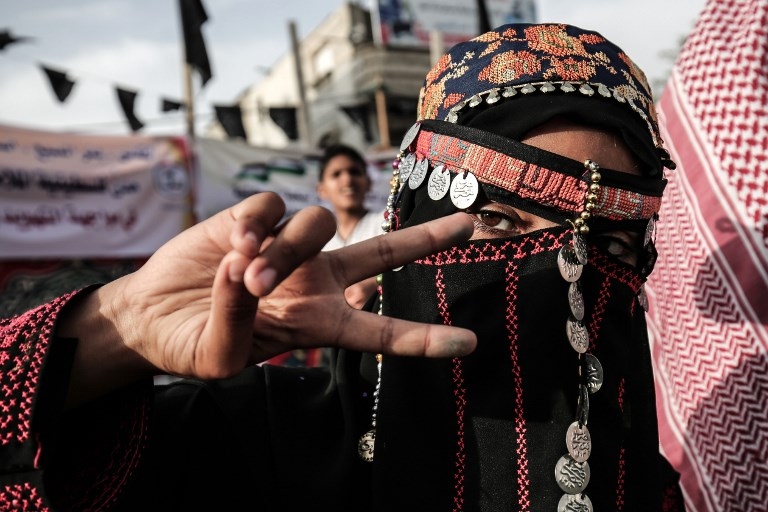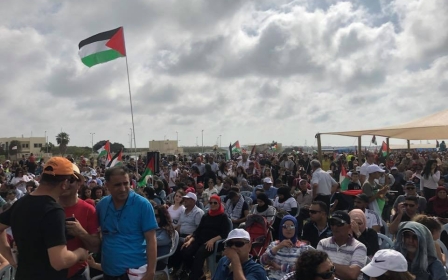From Palestine to Canada, the truth of indigenous narratives cannot be suppressed forever

The anniversary of the Nakba is observed on 15 May each year to preserve the memory of what is known as the "catastrophe" - the ethnic cleansing of Palestinians from the land comprising the modern state of Israel.
The 20 percent of Palestinian land that remains includes open-air prisons and territories occupied militarily and administratively by Israel through a complex matrix of control. Checkpoints, settlement expansion and home demolitions are among other apartheid-style policies that have turned Israel’s ethnic cleansing into a bureaucratic process.
A colossal injustice
Isreal has conjured up a piece of colonial fiction to abet this ongoing injustice: the idea that Israelis are a people without land moving to a land without people. Israeli citizenship rights, known as Aliyah, are a core part of the inequity visited upon this land and its people, where foreigners from Europe manipulated religious and political narratives to serve a settler-colonial agenda of racial and ethnic supremacy.
The Palestinian struggle for self-determination was recently bolstered by last month’s Great March of Return and subsequent protests, involving non-violent marches demanding Palestinians’ internationally, legally and morally protected indigenous rights to the land. This movement has brought a new kind of attention to the Palestinian struggle; they are literally imprisoned in this situation, whether they resist or accept. This ongoing cycle is remembered annually on 15 May, while the global community continues to enable Israel's impunity.
It is important for indigenous Canadians to realise that restoring and preserving their culture locally requires the preservation of the narratives of indigenous peoples globally, highlighting their joint struggle
Indigenous peoples the world over are all too familiar with these types of settler-colonial processes, especially in North America, where they have been subjected to ethnic cleansing, state-sponsored criminality and massacres - from the Canadian plains to Gustafsen Lake and Pine Ridge to Wounded Knee - to facilitate economic expansionism and expropriation.
One of the tactics that Israel uses to export its destruction of Palestinian memories is ideological colonialism of indigenous peoples around the world. A recent Tablet article discussed the visit of a Native American chief to Israel, in which he demanded: "The Arab occupation must be stopped and Samaria should be returned to the Jewish people as they have restored Jerusalem and the rest of the country to its owners." Similarly, Phil Fontaine, the former Assembly of First Nations chief turned oil pipeline supporter, was invited to visit Israel by the Canadian Jewish Congress and proclaimed a similarity between Canada’s indigenous peoples and Israel.
Memories destroyed
The same can be said of Ron Evans, chief of the Canadian First Nations community Norway House Cree Nation, who took an indigenous youth delegation to Israel in 2016. "Our aim is to develop the next generation of First Nations leaders by looking through the lens of Israel’s inspiring story… Those of us from First Nations communities can appreciate the fascinating balance between modern and ancient that we see in Israel, and especially the sense of connection to the land of one’s ancestors," Evans noted.
Last but not least is the infamous Ryan Bellerose, an Alberta Metis who is a staunch and outspoken supporter of Zionism. His organisation, Canada United With Israel, claims that it "takes a keen interest in global indigenous issues, with a specific focus on Canada's First Nations. We also seek out sincere allies in other communities with whom we share common ground to determine where our interests intersect… Some of our project areas include: Global Human Rights, the Law, International Indigenous Rights and Arab Zionism."
Hence, what we see with the Israeli penetration of indigenous communities in North America contributes directly to the ongoing Palestinian Nakba and indirectly to the colonisation of North American indigenous minds in the name of progress and enlightenment.
It is important for indigenous Canadians to realise that restoring and preserving their culture locally requires the preservation of the narratives of indigenous peoples globally, highlighting their joint struggle.
Idle no more
As Palestinians continue with their Great Return marches and remember the Nakba on its 70th anniversary, Canada's indigenous peoples are in the process of marching through their own version of the Great Return - the Idle No More movement, which has taken different shapes and forms.
As with the Palestinian story, the truth of North American indigenous narratives cannot be suppressed forever, as a natural and unstoppable approach to justice and reconciliation is led by the next generation.
Former Israeli Prime Minister David Ben Gurion infamously stated on 18 July 1948 that "the old will die and the young will forget". Palestinians have not forgotten, and as allies and indigenous brethren, we will not stand idle as the native peoples of North America are induced to forget.
- Ahmad Moussa is a human rights scholar and activist and a regular contributor and freelance writer for various international news agencies. He is a scholar of indigenous and Middle Eastern issues. He is also a human rights activist with a master of arts in international law and human rights. Moussa is currently involved in research for a doctoral degree in war studies.
The views expressed in this article belong to the author and do not necessarily reflect the editorial policy of Middle East Eye.
Photo: A Palestinian woman dressed in a traditional outfit poses for a picture during a rally to commemorate the 69th anniversary of the Nakba in the southern Gaza Strip in May 2017 (AFP)
New MEE newsletter: Jerusalem Dispatch
Sign up to get the latest insights and analysis on Israel-Palestine, alongside Turkey Unpacked and other MEE newsletters
Middle East Eye delivers independent and unrivalled coverage and analysis of the Middle East, North Africa and beyond. To learn more about republishing this content and the associated fees, please fill out this form. More about MEE can be found here.






